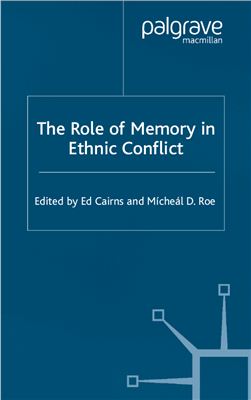Palgrave Macmillan, 2003. 201 p.
With the end of the Cold War, the hitherto concealed existence of a great many other conflicts, relatively small in scale, long-lived, ethnic in character and intrarather than inter-state has been revealed. The dramatic changes in the distribution of world power, along with the removal of some previously resolute forms of centralised restraint, have resulted in the re-emergence of older, historical ethnic quarrels, many of which either became violent and warlike or teetered, and
continue to teeter, on the brink of violence. For these reasons, ethnic conflicts and consequent violence are likely to have the greatest impact on world affairs during the next period of history.
This new series examines a range of issues related to ethnic and intercommunity conflict. Each book concentrates on a well-defined aspect of ethnic and intercommunity conflict and approaches it from a comparative and inteational standpoint.
Rather than focus on the macrolevel, that is on the grand and substantive matters of states and empires, this series argues that the fundamental causes of ethnic conflict are often to be found in the hidden roots and tangled social infrastructuresof the opposing separated groups. It is through the understanding of these foundations and the working out of their implications for policy and practical activity that may lead to ameliorative processes and the construction of transforming social mechanisms and programmes calculated to produce longterm peace.
Introduction: Why Memories in Conflict? Ed Cais and M?che?l D. Roe
A Theoretical Overview of Memory and Conflict. Patrick Devine-Wright
Memories of Aboriginal Pasts and Current Conflicts
Reconciliation between Black and White Australia: the Role of Social Memory. David Mellor and Di Bretherton
Cowlitz Indian Ethnic Identity, Social Memories and Years of Conflict with the United States Govement. M?che?l D. Roe
Conflicting Memories and Time
Collective Memory of Physical Violence: its Contribution to the Culture of Violence. Daniel Bar-Tal
Will the Germans Ever Be Forgiven? Memories of the Second World War Four Generations Later.
Louis Oppenheimer and Ilse Hakvoort
Conflicting Memories and Conflict Resolution
History Teaching and the Perpetuation of Memories: the Northe Ireland Experience. Keith C. Barton and Alan McCully
Memories of Recent Conflict and Forgiveness in Northe Ireland. Frances McLeon, Ed Cais, Christopher Alan Lewis and Miles Hewstone
Symbolic Closure through Memory, Reparation and Revenge in post-Conflict Societies. Brandon Hamber and Richard A. Wilson
Memories in Conflict: Review and a Look to the Future. M?che?l D. Roe and Ed Cais
With the end of the Cold War, the hitherto concealed existence of a great many other conflicts, relatively small in scale, long-lived, ethnic in character and intrarather than inter-state has been revealed. The dramatic changes in the distribution of world power, along with the removal of some previously resolute forms of centralised restraint, have resulted in the re-emergence of older, historical ethnic quarrels, many of which either became violent and warlike or teetered, and
continue to teeter, on the brink of violence. For these reasons, ethnic conflicts and consequent violence are likely to have the greatest impact on world affairs during the next period of history.
This new series examines a range of issues related to ethnic and intercommunity conflict. Each book concentrates on a well-defined aspect of ethnic and intercommunity conflict and approaches it from a comparative and inteational standpoint.
Rather than focus on the macrolevel, that is on the grand and substantive matters of states and empires, this series argues that the fundamental causes of ethnic conflict are often to be found in the hidden roots and tangled social infrastructuresof the opposing separated groups. It is through the understanding of these foundations and the working out of their implications for policy and practical activity that may lead to ameliorative processes and the construction of transforming social mechanisms and programmes calculated to produce longterm peace.
Introduction: Why Memories in Conflict? Ed Cais and M?che?l D. Roe
A Theoretical Overview of Memory and Conflict. Patrick Devine-Wright
Memories of Aboriginal Pasts and Current Conflicts
Reconciliation between Black and White Australia: the Role of Social Memory. David Mellor and Di Bretherton
Cowlitz Indian Ethnic Identity, Social Memories and Years of Conflict with the United States Govement. M?che?l D. Roe
Conflicting Memories and Time
Collective Memory of Physical Violence: its Contribution to the Culture of Violence. Daniel Bar-Tal
Will the Germans Ever Be Forgiven? Memories of the Second World War Four Generations Later.
Louis Oppenheimer and Ilse Hakvoort
Conflicting Memories and Conflict Resolution
History Teaching and the Perpetuation of Memories: the Northe Ireland Experience. Keith C. Barton and Alan McCully
Memories of Recent Conflict and Forgiveness in Northe Ireland. Frances McLeon, Ed Cais, Christopher Alan Lewis and Miles Hewstone
Symbolic Closure through Memory, Reparation and Revenge in post-Conflict Societies. Brandon Hamber and Richard A. Wilson
Memories in Conflict: Review and a Look to the Future. M?che?l D. Roe and Ed Cais

